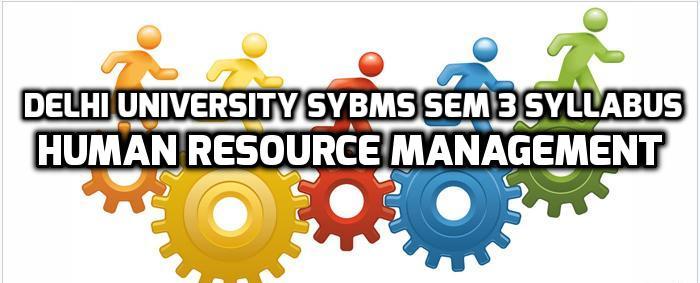Human Resource Management subject is study of the process of recruiting and developing employees so that they can become more valuable to the organization. HRM or Human Resource Management includes job analysis, planning, recruiting the right person for the job, training, performance evaluation and communicating with all employees at all levels. The objective of HRM subject is to help DU BMS students to develop an understanding of the concept and techniques of essential functions of human resource management. (Paper No. 5 of Undergraduate Programme in Bachelor of Management Studies)
Here we present DU SYBMS Sem 3 Syllabus: Human Resource Management:
Unit 1 – 10 lectures
- Human Resource Management – Concept, Functions, roles, skills and competencies
- HRD- definition, goals and challenges
- Changing environment of HRM- globalization, cultural environment, technological advances, workforce diversity, corporate downsizing, changing skill requirement
- HRM support for improvement programs
- Work life balance
- HR role in strategy formulation and gaining competitive advantage
- Balanced scorecard
Unit 2 – 15 lectures
- Human Resource Planning – process, forecasting demand and supply
- Skill inventories
- Human Resource Information System (HRIS)
- Succession planning
- Job analysis – uses, methods
- Job description and job specifications
- HR accounting and Human Resource Development (HRD) Audit concept
- Recruitment, Selection and Orientation: internal and external sources
- E-recruitment – advantages and disadvantages of internal and external recruitment
- Selection process
- Orientation process
- International staffing – geocentric, ethnocentric, polycentric approaches
Unit 3 – 14 lectures
- Training – concept, needs, systematic approach to training
- Methods of training
- Management development – concepts and methods
- Performance management system – concept
- Uses of performance appraisal
- Performance management methods
- Factors that distort appraisal
- Appraisal interview
- Career planning – career anchors, career life stages, career planning
Unit 4 – 8 lectures
- Compensation – Steps of determining compensation
- Job evaluation
- Components of pay structure
- Factors influencing compensation levels
- Wage differentials and incentives
- Profit sharing
- Gain sharing
- Employees’ stock option plans
- Brief introduction of social security, health, retirement and other benefits
Unit 5 – 9 lectures
- Industrial relations – introduction
- Trade unions role, types, functions, problems,
- Industrial dispute – concept, causes and machinery for settlement of disputes- grievance, concepts, causes and grievance redressal machinery
- Discipline concept
- Aspect of discipline and disciplinary procedure
- Collective bargaining – concept, types, process, problems, essentials of effective collective bargaining
- Contemporary issues – quality circles,
- Labour and International Labour Organization (ILO)
- World Trade Organization (WTO)
- Reports of the National Labour Commissions.
Textbooks and Reference Books:
- Fundamentals of Human Resource Management – De Cenzo, D.A. & Robbins, S.P. (2006)
- Human Resource Management – Dessler, G.
- Personnel Management – Monappa and Saiyaddin
- Human Resource Management : Text and cases – Rao, V.S.P.




87 Comments